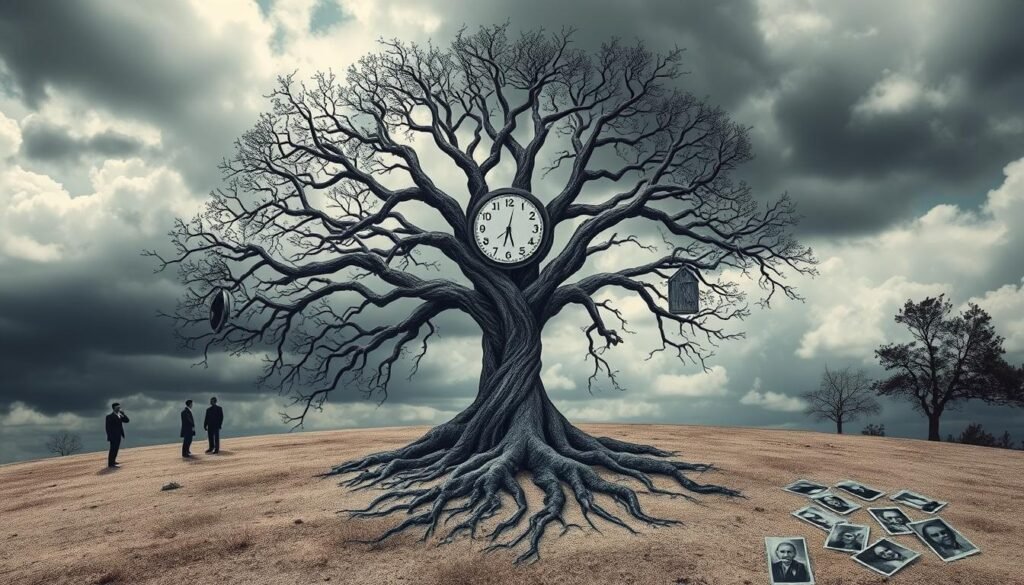Ever noticed how some people are deeply impacted by life events while others aren’t? This question becomes more intriguing when looking at atypical depression, a mood disorder that’s not widely known. Despite being common, many are still in the dark about atypical depression’s symptoms and how to treat it. This article will highlight what makes this condition unique, including its symptoms, how it’s diagnosed, and ways to manage it. Highlighting mental health, especially atypical depression, is essential for better understanding and support.
Key Takeaways
- Atypical depression often presents symptoms during teenage years.
- Diagnosis requires mood reactivity and at least two specific symptoms.
- Effective treatment combines psychotherapy and medication.
- Self-care strategies can significantly aid in depression management.
- Atypical depression shows a prevalence of around 40% in outpatient clinics.
What is Atypical Depression?
Atypical depression is a subtype of major depression that’s unique. It helps to understand the definition of atypical depression to know its special traits. It shows symptoms that are different from usual depressive disorders. These include a mix of emotional and physical challenges.
This kind of depression is known for mood reactivity. This means a person’s mood gets better after good things happen. It usually starts in someone’s teens or early twenties. Studies say it affects about 15-29% of people with depression, showing these uncommon symptoms.
More women have atypical depression than men, with a ratio of four to one. Issues like anxiety can make diagnosing and treating it harder. Patients might also show signs of bipolar disorder or seasonal affective disorder. Check out more details at immune-vitality.com.
For correct treatment, specialists look at many symptoms and factors for two weeks. The American Psychiatric Association now sees it as major depression with atypical features. This helps in finding the right treatment. Treatments may include medicine, talk therapy, and changes in daily activities.
Recognizing the Symptoms of Atypical Depression
Atypical depression comes with unique challenges. Knowing the symptoms of atypical depression
One common symptom is mood reactivity. This means people might feel better after happy events, unlike traditional depression.
- Pathologic rejection sensitivity: About 71% of individuals with atypical depression feel very sensitive to rejection. This is a widespread symptom.
- Increased appetite and overeating: Nearly 47% of patients eat more than usual, often gaining weight.
- Hypersomnia: About 35% suffer from excessive sleepiness, which affects their day-to-day life.
- Leaden paralysis: A heavy feeling in the limbs is common, impacting how well people can move.
To meet the atypical depression diagnostic criteria, doctors search for two more symptoms alongside mood reactivity. This ensures a full assessment, leading to care that fits each person’s needs. Recognizing these symptoms helps both people and doctors find the best way to handle this type of depression.
| Symptom | Prevalence (%) |
|---|---|
| Pathologic Rejection Sensitivity | 71 |
| Overeating | 47 |
| Leaden Paralysis | 47 |
| Hypersomnia | 35 |
Differences Between Atypical Depression and Other Depressive Disorders
Atypical depression is different from other depressive disorders. It doesn’t make people lose pleasure and motivation like melancholic depression does. Instead, if something good happens, their mood might get better. This is not what happens with melancholic depression.
People with atypical depression tend to eat and sleep more. This is the opposite of those with unipolar depression, who eat and sleep less. There are many types of depression, so it’s important to diagnose and treat them correctly.
Atypical depression also overlaps with other mood disorders. About 20% of people with mood disorders, like bipolar disorder and persistent depressive disorder, show atypical features. It’s seen more in women and usually starts before age 20. It can lead to long-term problems.
It’s very important to understand these complex details. When planning treatment, doctors must consider many factors. Things like family history, stress, and other mood disorders play a big role. Accurate diagnosis is key to helping patients with different kinds of depression.
The Role of Mood Reactivity in Atypical Depression
Mood reactivity makes atypical depression different from other types. Those with it may feel temporarily better after good things happen. This ability to feel better, even if it’s just for a short while, is unique. It’s not something seen in other, more constant types of depression.
Mood reactivity is key in understanding atypical depression’s impact. It helps decide which treatments might work best. Knowing if a person’s mood can get better or worse helps doctors find the best way to help. Positive events making someone feel better is a clue for doctors. It helps them diagnose and treat atypical depression correctly.
Clinical studies show people with atypical depression can react strongly to good experiences. Understanding these reactions helps doctors provide care that really fits each person. This leads to treatments that are more effective because they’re more personal. And that means patients are more likely to feel better in the long run.

Common Comorbid Conditions with Atypical Depression
Atypical depression often comes with other health issues, making it hard to diagnose and treat. Many people with depression, around 15% to 30%, show only atypical symptoms. This condition is commonly linked with anxiety disorders, like social anxiety, increasing the mental health struggles patients face. Atypical depression is also more common in women, smokers, and those who feel socially isolated.
About 15.7% to 36.6% of those diagnosed with depression have atypical features. This type of depression is found in around 18% of cases, both in the community and clinical settings. Studies, including the STAR*D series, highlight its prevalence. Bipolar disorder or dysthymic disorder patients show atypical depression in up to 50% of cases. This shows how intertwined depression is with other mental health issues.
There’s a strong link between social anxiety and atypical depression. This makes treating patients more complex, as doctors need to consider various conditions together. Those with atypical depression face a longer battle with their symptoms. They often start experiencing these challenges earlier than others with different types of depression.
Furthermore, people with atypical depression are more likely to suffer from additional issues. These include cluster B and C personality disorders, substance abuse, and somatization disorder. Understanding the complex connection between these conditions is crucial for providing effective care and support.
Causes and Risk Factors for Atypical Depression
Atypical depression comes from different causes. These include genetic, environmental, and psychological reasons. Understanding these elements helps us know why it happens.
Risk factors for atypical depression have to do with family history. If depression runs in a family, a person might be more likely to get it. Stressful events or trauma can also play a role.
Things like losing someone close, facing abuse, or big changes in life can make symptoms worse. People with this type of depression often face symptoms earlier than others. Knowing these causes and risk factors is vital for those who provide care.

| Risk Factor | Description |
|---|---|
| Genetic Predisposition | Family history of depression increases susceptibility to atypical depression. |
| Life Stressors | Experiencing loss, trauma, or major life changes can trigger symptoms. |
| Environmental Influences | Serious medical conditions and substance use can escalate the risk. |
| Age of Onset | Tends to occur earlier than other depressive disorders. |
Diagnosing Atypical Depression: The Importance of Evaluation
Proper diagnosis is key in treating atypical depression well. Mental health checks are crucial to tell it apart from other mood issues. Doctors use psychiatric evaluation questionnaires to learn about a person’s symptoms and past.
About 15-29% of people with Major Depressive Disorder have atypical depression symptoms. It’s 2-3 times more common in women, showing a gender bias in diagnosis. A detailed mental health check can reveal these trends, allowing for a correct diagnosis.
Doctors might use tools like the psychiatric evaluation questionnaire during diagnosis. These tools help confirm the diagnosis and shape treatment plans. It’s estimated that 18% to 36% of depressed patients might have atypical depression, highlighting the need for careful diagnosis.
Spotting atypical depression early can really aid in recovery. Knowing the specific symptoms, like more hunger and sleeping a lot, helps tailor treatment. For more info on diagnosing atypical depression, visit this resource.
Treatment Options for Atypical Depression
Treatment for atypical depression combines various depression management options. This approach ensures the best outcomes. Psychotherapy is critical in dealing with the root problems of this condition. Cognitive-behavioral therapy (CBT) is especially popular, helping change negative thought patterns.
Medication is also key in treating atypical depression. Studies have found that monoamine oxidase inhibitors (MAOIs) work better than common antidepressants like SSRIs. But, MAOIs can lead to side effects such as nausea and dry mouth. So, healthcare providers must customize treatment plans for every patient.
The following table provides a concise overview of various treatment for atypical depression options, their effectiveness, and potential side effects:
| Treatment Type | Effectiveness | Potential Side Effects |
|---|---|---|
| Psychotherapy (CBT) | High | Minimal |
| SSRIs | Moderate | Weight gain, sexual dysfunction |
| MAOIs | High | Nausea, dry mouth, lightheadedness |
| Combination Therapy | Very High | Varies by individual |
With proper psychotherapy and medication, most can greatly improve from atypical depression symptoms. It’s important for those suffering to try different treatments. Keeping in touch with healthcare providers helps find the most effective treatment.
Psychotherapy Techniques for Managing Atypical Depression
Atypical depression is a type of major depressive disorder. It demands unique methods of care. Psychotherapy is key in tackling its symptoms, playing a massive part in recovery. CBT, or Cognitive-behavioral therapy, is great at changing negative thought patterns. It helps people see things in a healthier way.
Interpersonal therapy (IPT) focuses on bettering relationships and being socially active, which atypical depression often harms. Mindfulness-based methods are also useful. They help manage emotions better and boost mental health.
Using these mental health strategies together can lead to customized help that fits each person’s needs. Regular talk therapy sessions provide a safe place to deal with hard feelings. This includes feeling worthless, wanting to be alone, and dealing with anxiety. Staying involved in therapy can lead to major symptom relief, better emotional control, and improved daily life.
| Psychotherapy Technique | Focus Area | Benefits |
|---|---|---|
| Cognitive-Behavioral Therapy (CBT) | Identifying and altering negative thoughts | Enhances coping strategies and self-awareness |
| Interpersonal Therapy (IPT) | Improving relationships | Strengthens social support networks |
| Mindfulness-Based Strategies | Emotional regulation | Increases resilience and reduces anxiety symptoms |
Therapy sessions have structured plans to give everyone personalized care. Progress in therapy boosts one’s ability to face emotional and mental challenges. It’s especially true for those battling atypical depression.
Medications Used to Treat Atypical Depression
Treating atypical depression often involves various medications. They are chosen based on each person’s unique needs. Common choices include SSRIs, SNRIs, and MAOIs. These balance neurotransmitter levels in the brain. This helps improve mood and reduce symptoms.
FDA-approved atypical antidepressants include:
- Bupropion (Wellbutrin SR, Wellbutrin XL, others)
- Mirtazapine (Remeron)
- Nefazodone
- Trazodone
- Vilazodone (Viibryd)
- Vortioxetine (Trintellix)
- Esketamine (Spravato)
While these medications can help, they may have side effects.
Common ones include:
- Dry mouth
- Dizziness
- Insomnia
- Weight gain
- Nausea
- Sexual side effects
Doctors must be careful when prescribing these drugs. They may not be suitable for everyone. Some drugs pose risks for people with certain health conditions.
Some antidepressants could increase bleeding, particularly with other drugs that also raise bleeding risks.
Serotonin syndrome is a rare but serious condition. It can occur when mixing certain antidepressants with other substances. Thus, open communication between the patient and doctor is key when choosing medications.
Finding the right medication may take time. What works for one person may not work for another. Genetics may also affect how someone responds to medication. For those hard to treat cases, adding different types of drugs may be helpful.

Self-Care Strategies for Coping with Atypical Depression
People with atypical depression can gain a lot from self-care. Doing regular exercise is key. The U.S. Department of Health and Human Services suggests 150 minutes of exercise each week. Physical activity boosts mood by releasing endorphins. It’s vital for improving mental health.
Eating right is also important for mental wellness. Adding foods rich in magnesium, folic acid, and vitamin B helps your mood. Studies show that certain amino acids can reduce depression and anxiety. This proves eating mindfully is crucial for fighting depression.
Good sleep is crucial for managing depression symptoms. Missing out on sleep can make you feel sad and very tired. Having a regular sleep pattern improves sleep quality and helps in managing depression.
Mindfulness, like meditation and yoga, helps you deal with emotions. These activities strengthen your ability to cope with depressive feelings. They make you emotionally stronger.
Having a support network is key to feeling better. Talking with friends, family, or groups gives you needed emotional support. Taking part in social activities also helps fight the loneliness that comes with atypical depression.
To sum up, fighting atypical depression involves several lifestyle changes. Exercise, right food, enough sleep, mindfulness, and socializing all play a part. Together, they can greatly reduce depression symptoms and boost well-being.
Conclusion
Understanding atypical depression is key for good care. It helps both patients and healthcare workers. They learn about symptoms, causes, and treatments.
Being informed helps them decide the best care. This leads to better health and improves life quality.
This summary of treatment options shows how key mood reactivity, co-existing illnesses, and early help are. With the right strategies and therapies, patients can improve their mental health.
Adding mental health advice to daily life is vital for dealing with atypical depression. It helps tackle the mental and physical sides of the condition. This support helps individuals reach their full potential despite atypical depression’s challenges.